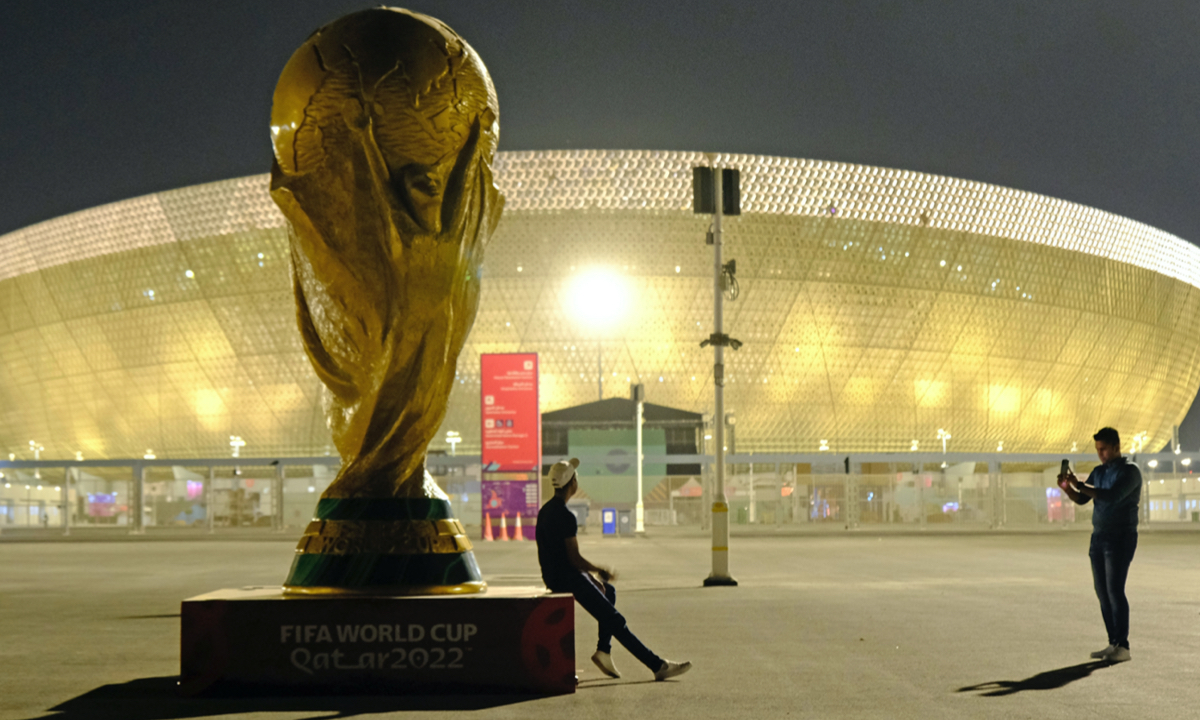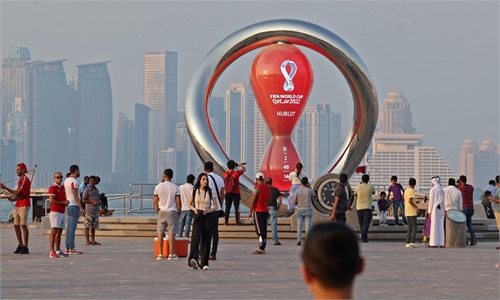Fans welcome World Cup Qatar enthusiastically despite COVID pandemic
Chinese wisdom, strength contribute hugely to sports gala’s preparations

Lusail Stadium, the largest World Cup Venue in Qatar with a capacity of 80,000 people Photo: VCG
Although the Chinese men's national team did not enter the World Cup in Qatar, the enthusiasm of Chinese fans for the sports gala has not been affected as some fans traveled to Qatar to participate in the top event despite the pandemic, while others are enjoying the atmosphere with Chinese elements shining at the festival.
Data from Chinese online travel platform Ctrip showed that as of November 11, flight bookings to Qatar from China with departure dates from November 20 to December 18 are up more than 28 times over the same period in 2021.
"The arrival of the two pandas in Qatar just in time for the opening of the World Cup is not only the result of the ongoing efforts of both sides, but also a beautiful coincidence," Chinese Ambassador to Qatar Zhou Jian said in a recent media interview.
As for the Chinese fans who didn’t make it to Qatar, they are enjoying the World Cup atmosphere in their own way. Even though the games will be held on cold winter nights in most parts of China, fans are no less enthusiastic.
Many shopping malls and streets in major cities have been decorated with World Cup items and themes, including giant inflatable balls, star stands, banners and more.
Many restaurants are also ready to provide fans with special menus during the World Cup. A hot pot restaurant in Chengdu, Southwest China's Sichuan Province, brought "soccer" to the table with a golden soccer ball-shaped butter base and a card in the box to guess the winning team.
A renowned Beijing restaurant added "fire extinguisher beer" to its World Cup set menu, putting beer in fire extinguisher-shaped bottles to let diners “take the heat off” when the team loses.
Bars are also important places for Chinese fans to watch the soccer games. The Traffic Management Department under the China's Ministry of Public Security even issued an announcement on Saturday, reminding fans watching the World Cup of avoiding drinking and driving. The ministry said public security and traffic authorities across the country will launch a crackdown on drunk driving during the World Cup, and seriously deal with related criminal activities to protect people's lives and property.
Chinese fans have also explored new places to watch the games. For example, a fan surnamed Han chose to watch the game at a camping site because he was worried that watching late at night would affect his family's sleep.
Some camping sites are also offering luxury rooms and large private rooms for fans to watch the event, which are also well-received, according to media reports.
However, due to the COVID-19 outbreak in some cities, some fans told the Global Times they are choosing to watch the games at home with their families.
"I'm going to buy a lot of beer, order take-out food when the games are on, and watch the game while chatting with my friends online," a Beijing-based fan surnamed Tang told the Global Times. "This will probably be a very memorable World Cup for me."
Although Team China missed out on the World Cup once again, the Chinese elements are shining at the Qatar World Cup.
Lusail Stadium is the largest World Cup Venue in Qatar with a capacity of 80,000 people. The stadium was built by China Railway International Group and delivered in December 2020.
The image of the stadium has been printed on the recently issued 10 Qatari riyals banknote, which is the first time a landmark building constructed by a Chinese company has appeared on Qatari currency, Ambassador of Qatar to China Mohammed bin Abdullah Al Dehaimi told the Global Times in an earlier interview.
"Chinese state-owned enterprises were the main force involved in the construction of the World Cup in Qatar, contributing Chinese wisdom and strength to the preparations, as well as creating a good image of Chinese construction and Chinese brands, and becoming a model of high-quality construction of the Belt and Road Initiative of China and Qatar," said Chinese Ambassador Zhou.
The Lusail Stadium is not only an important facility for the 2022 World Cup, but also a historic project that marks the pragmatic cooperation between the two countries and deepens their relationship, said Ambassador Al Dehaimi.
“We also thank the Chinese side, especially the Chinese companies in Qatar, for their contributions to the successful preparations for the World Cup,” he said.



